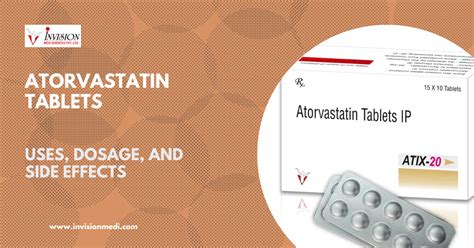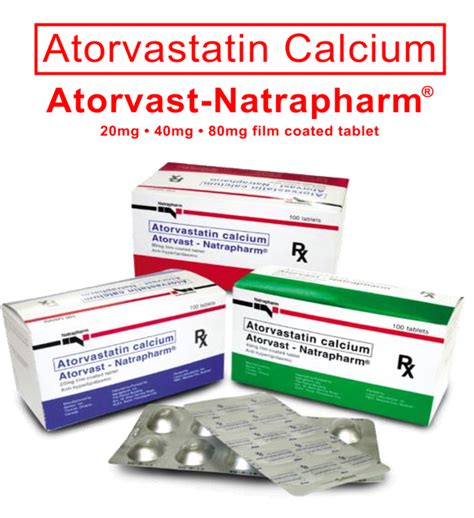Intro
Learn about Atorvastatin 20mg side effects, interactions, and warnings. Discover common symptoms, dosage risks, and cholesterol-lowering benefits, managing high cholesterol and cardiovascular disease with this statin medication.
Atorvastatin 20mg is a commonly prescribed medication for managing high cholesterol and reducing the risk of heart disease. As with any medication, it's essential to be aware of the potential side effects associated with atorvastatin 20mg. In this article, we'll delve into the importance of understanding atorvastatin 20mg side effects, its benefits, and how to minimize potential risks.
High cholesterol is a significant health concern that can lead to serious cardiovascular problems, including heart attacks, strokes, and peripheral artery disease. Atorvastatin 20mg, a statin medication, works by inhibiting the production of cholesterol in the liver, thereby reducing the levels of low-density lipoprotein (LDL) or "bad" cholesterol in the blood. By taking atorvastatin 20mg as directed, individuals can significantly lower their risk of developing cardiovascular disease.
However, like all medications, atorvastatin 20mg can cause side effects, some of which may be mild and temporary, while others can be more severe and persistent. It's crucial for patients to be aware of the potential side effects of atorvastatin 20mg to ensure they can manage their condition effectively and minimize potential risks. In the following sections, we'll explore the benefits, working mechanisms, and potential side effects of atorvastatin 20mg in more detail.
Benefits of Atorvastatin 20mg

How Atorvastatin 20mg Works
Atorvastatin 20mg works by inhibiting the enzyme HMG-CoA reductase, which plays a crucial role in the production of cholesterol in the liver. By blocking this enzyme, atorvastatin 20mg reduces the amount of cholesterol produced in the liver, thereby lowering the levels of LDL cholesterol in the blood. Additionally, atorvastatin 20mg increases the production of HDL cholesterol, which helps to remove excess cholesterol from the bloodstream.Potential Side Effects of Atorvastatin 20mg

Common Side Effects of Atorvastatin 20mg
Some of the most common side effects of atorvastatin 20mg include: * Muscle pain or weakness (affecting up to 10% of patients) * Joint pain or inflammation (affecting up to 5% of patients) * Headaches or dizziness (affecting up to 5% of patients) * Nausea or vomiting (affecting up to 2% of patients) * Diarrhea or constipation (affecting up to 2% of patients)Minimizing the Risk of Side Effects

Interactions with Other Medications
Atorvastatin 20mg can interact with other medications, including: * Warfarin (a blood thinner) * Digoxin (a heart medication) * Erythromycin (an antibiotic) * Clarithromycin (an antibiotic) * Cyclosporine (an immunosuppressant)Long-Term Effects of Atorvastatin 20mg

Monitoring and Follow-Up
To minimize the risk of long-term effects, patients should: * Attend regular follow-up appointments with their doctor * Monitor their liver function and cholesterol levels regularly * Report any side effects or concerns to their doctor promptly * Maintain a healthy diet and exercise regularlyConclusion and Next Steps

We invite you to share your thoughts and experiences with atorvastatin 20mg in the comments section below. Have you taken atorvastatin 20mg and experienced any side effects? Do you have any questions or concerns about the medication? Share your story and help others make informed decisions about their treatment.
What are the most common side effects of atorvastatin 20mg?
+The most common side effects of atorvastatin 20mg include muscle pain or weakness, joint pain or inflammation, headaches or dizziness, nausea or vomiting, and diarrhea or constipation.
Can atorvastatin 20mg cause long-term effects?
+Yes, long-term use of atorvastatin 20mg has been associated with several potential risks, including increased risk of diabetes, cognitive impairment or memory loss, liver damage or elevated liver enzymes, increased risk of cataracts, and increased risk of osteoporosis.
How can I minimize the risk of side effects when taking atorvastatin 20mg?
+To minimize the risk of side effects, patients should take the medication as directed by their doctor, monitor their liver function and cholesterol levels regularly, report any side effects or concerns to their doctor promptly, avoid drinking excessive amounts of alcohol, and maintain a healthy diet and exercise regularly.
